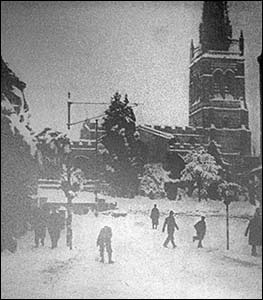|
|||
| The Rushden Echo & Argus, 2nd February 1940, transcribed by Gill Hollis |
|||
|
Rushden In The Big Freeze-Up
|
|||
|
A Memorable Spell of Hard Weather
|
|||
|
At long last the Great Freeze-up is publishable. It would have made a great story at the proper time; even now it demands more than a casual record and continues to be the subject of gossip everywhere. The story comes from memorable material – it is the story of the most severe weather that the under-forties in this district can remember. There was a great blizzard in 1916 – sharp but short. There have been heavy snowfalls to fix various winters in the popular memory. The opening of 1940 has lacked the wildness of some occasions, but for sheer sustained severity and lowness of temperature it leads the way in the weather history of the century.
In the ordinary way a mantle so light would soon have disappeared – but this was no ordinary occurrence. The mercury went down to regions unheard of, and it stayed there as week after week went by. Rushden people found themselves living in a world of ice. 25 Degrees of Frost
At the first opportunity the leaden skies delivered more snow, and in this phase of the long Arctic spell Rushden had severer treatment than Kettering, Northampton or even Wellingborough. Now damage and dislocation began. In the streets gangs of labourers joined the Council’s regular men in an attempt to clean up the carriageways; lorries and freighters bore off their icy loads to Spencer Park and other dumping grounds. Great quantities of sand, grit and salt were thrown about. Night after night the thermometer registered round about 25 degrees of frost. So did the water pipes, and eventually the freezing-up of water supplies was beyond all previous experience. It came to a climax on a Sunday morning when almost every home had its taps out of action. Some people managed to burst their pipes by injudicious thawing methods; to many more it happened just the same. Pipes even burst underground, and in Council houses alone, according to popular rumour, 200 jobs awaited the plumber. Damage and Accidents
The plumbers, far from discounting this story, have since asserted that the estimate might well be multiplied by two or three. In the first place they merely knocked up the spouting pipes; they are now enjoying the boom of a lifetime. There was serious damage to heating apparatus in churches, factories and garages. Gas mains also suffered from the frost-fractures, and squads of men from the Gas Company were kept busy at several points. Road traffic encountered every kind of difficulty, and several minor accidents resulted from skids. Ice-skaters found plenty of sport if they went far afield, but in the absence of initial flooding they were not so lucky in their home district, though the Nene was largely frozen-up at one time. Later weather news is under a somewhat tangled veil, but Great Britain admits that her road and railway traffic have been sharply dislocated. Rushden, in particular admits some interference with meat, milk and coal supplies, the delayed arrival of general goods, the curtailment of ‘bus services, especially after dark, the non-arrival of two church organists (both resident at Raunds) for services last Sunday morning, and the recent difficulty of contact with Newton Bromshold and other villages. |
|||
